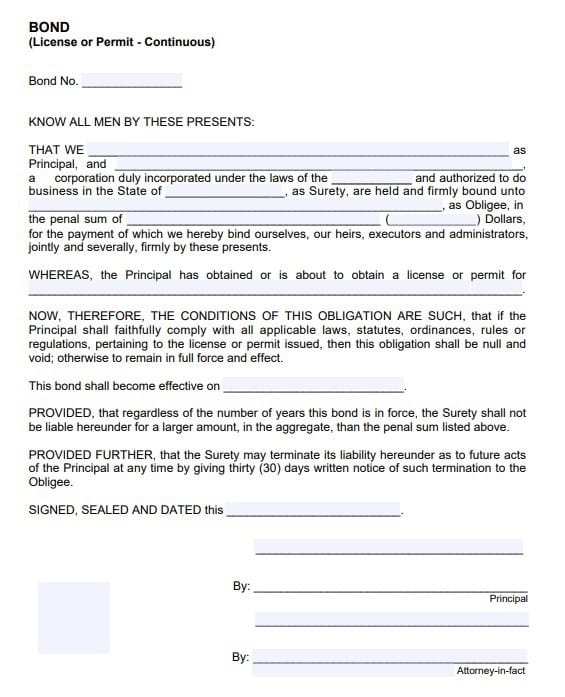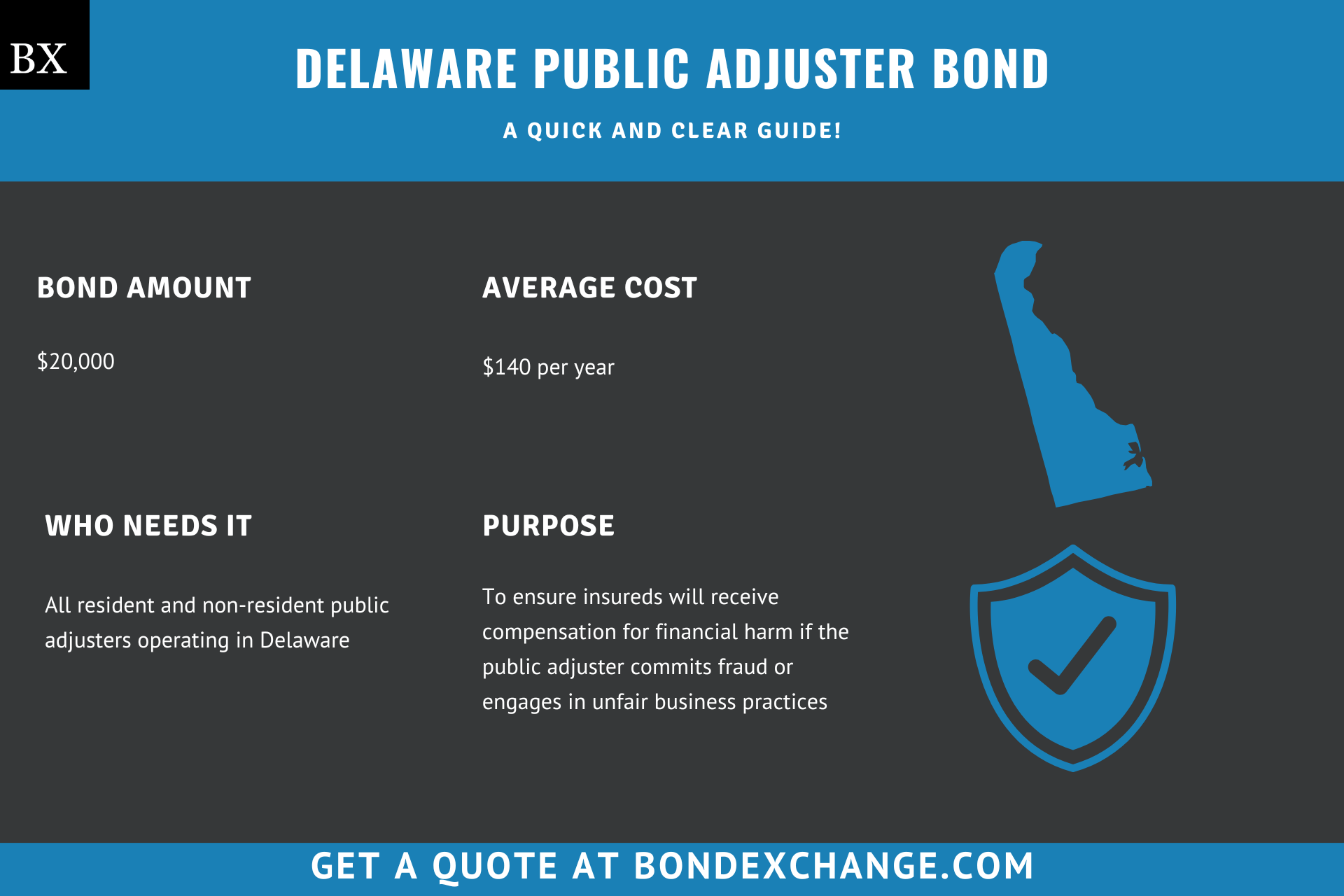Delaware Public Adjuster Bond: A Comprehensive Guide
This guide provides information for insurance agents to help their customers obtain a Delaware Public Adjuster bond
At a Glance:
- Average Cost: $140 per year or $14 per month
- Bond Amount: $20,000
- Who Needs it: All resident and non-resident public adjusters operating in Delaware
- Purpose: To ensure insureds will receive compensation for financial harm if the public adjuster commits fraud or engages in unfair business practices
- Who Regulates Public Adjusters in Delaware: The Delaware Insurance Commissioner

Background
Delaware Statute 1751 requires all public adjusters operating in the state to obtain a license from the Department of Insurance. The Delaware legislature enacted the licensing requirement to ensure that public adjusters do not engage in unethical business practices. To provide financial security for the enforcement of the licensing law, both resident and non-resident public adjusters must purchase and maintain a $20,000 surety bond to be eligible for licensure.
What is the Purpose of the Delaware Public Adjuster Bond?
Delaware requires public adjusters to purchase a surety bond as part of the application process to obtain a license. The bond ensures that insureds will receive compensation for financial harm if the public adjuster fails to abide by the regulations outlined in Delaware Statute 1752. Specifically, the bond protects insureds if the public adjuster engages in any acts of fraud or unfair business practices. In short, the bond is a type of insurance that protects insureds if the public adjuster violates the terms of their license.
How Can an Insurance Agent Obtain a Delaware Public Adjuster Surety Bond?
BondExchange makes obtaining a Delaware Public Adjuster bond easy. Simply log in to your account and use our keyword search to find the “public adjuster” bond in our database. Don’t have a login? Gain access now and let us help you satisfy your customers’ needs. Our friendly underwriting staff is available by phone at (800) 438-1162, email, or chat from 7:30 AM to 7:00 PM EST to assist you.
At BondExchange, our 40 years of experience, leading technology, and access to markets ensures that we have the knowledge and resources to provide your clients with fast and friendly service whether obtaining quotes or issuing bonds.
Not an agent? Then let us pair you with one!
Click the above image to find a BX Agent near you
Is a Credit Check Required for the Delaware Public Adjuster Bond?
No, a credit check is not required for the Delaware Public Adjuster bond. Because the bond is considered relatively low risk, the same rate is offered to all public adjusters in Delaware regardless of their credit history.
How Much Does the Delaware Public Adjuster Bond Cost?
The Delaware Public Adjuster bond costs just $140 per year or $14 per month.
Who is Required to Purchase the Delaware Public Adjuster Bond?
Delaware requires public adjusters to purchase a surety bond as a prerequisite to obtaining a professional license. To paraphrase Delaware Statute 1750, a public adjuster is a person that acts on the behalf of or aids insureds in negotiating the settlement of first-party insurance claims.
BondExchange now offers monthly pay-as-you-go subscriptions for surety bonds. Your customers are able to purchase their bonds on a monthly basis and cancel them anytime. Learn more here.
How Do Public Adjusters Become Licensed in Delaware?
Public adjusters in Delaware must navigate several steps to obtain a license. Below are the general guidelines, but applicants should refer to the Department of Insurance’s licensing page for details on the process.
License Period – The Delaware Public Adjuster License is perpetual and will only expire if the adjuster fails to satisfy all continuing education requirements and pay all renewal fees (due every two years)
Step 1 – Purchase a Surety Bond
Both resident and non-resident public adjusters must purchase and maintain a $20,000 surety bond.
Step 2 – Complete the Application
All Delaware Public Adjuster License applications should be submitted online through the NIPR. Public adjusters must complete the application in its entirety and pay a $100 application fee.
Step 3 – Obtain a Criminal History Report
Public adjusters must obtain both a state and federal criminal history report from the Delaware State Police and fax these reports to (302) 736-7906.
Step 4 – Pass the Exam
After submitting their application, public adjusters must pass a licensing exam administered by Pearson Vue. Adjusters can schedule their exams online here. Public adjusters do not need to take the Delaware exam if they currently hold a public adjuster license in another state that has an exam requirement, provided the other state does not require public adjusters licensed in Delaware to take an exam before conducting business within their borders.
How do Delaware Public Adjusters Renew Their Licenses?
Public adjuster licenses in Delaware are perpetual and do not expire. However, public adjusters must complete 12 hours of continuing education and pay a $100 renewal fee by the last day of February of even-numbered years.
What are the Insurance Requirements for Public Adjusters in Delaware?
Delaware does not require public adjusters to purchase any form of liability insurance as a prerequisite to obtaining a license. Both resident and non-resident public adjusters must purchase and maintain a $20,000 surety bond.
How Do Delaware Public Adjusters File Their Bonds?
Public adjusters should submit their completed bond forms, including the power of attorney, to [email protected]. The surety bond requires signatures from the surety company and the public adjuster. The surety company should include the following information on the bond form:
- Legal name of the individual buying the bond
- Surety company’s name and state of incorporation
- Entity requiring the bond
- Bond amount
- License being applied for
- Date the bond is signed
- Date the bond goes into effect
What Can Delaware Public Adjusters do to Avoid Claims Made Against Their Bonds?
To avoid claims against their bonds, public adjusters in Delaware must follow all license regulations in the state, including some of the most important issues below that tend to cause claims:
- Do not commit fraud
- Do not engage in unfair business practices
What Other Insurance Products Can Agents Offer Public Adjusters in Delaware?
Most reputable public adjusters will purchase business liability insurance. Bonds are our only business at BondExchange, so we do not issue any other types of insurance, but our agents often utilize brokers for this specific line of business. A list of brokers in this space can be found here.
How Can Insurance Agents Prospect for Delaware Public Adjusters?
Agents can obtain a full list of all Delaware public adjusters through the NAIC. However, agents may need to pay a fee to do so. Contact BondExchange for additional marketing resources. Agents can also leverage our print-mail relationships for discounted mailing services.


